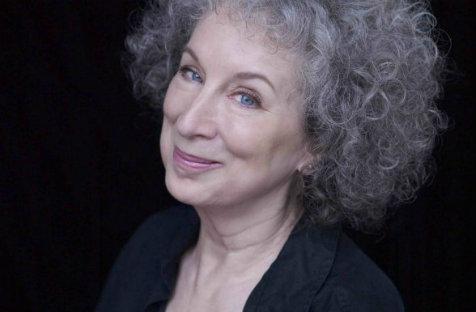Perth-based writer and reviewer Carol Flavell Neist is writing a daily diary detailing her Perth Writers’ Festival highlights, with a special focus on speculative fiction: read day one here and her day three report here.
Saturday morning, and I got ready to go out bright and early, because I knew it would take well over an hour to get the University by public transport. In fact, it took nearly two hours. All in the cause of Art …
At 11.00 AM I had to choose among no fewer than seven different offerings in the various theatres and purpose-built tents around the lawns of UWA. Reluctantly, I narrowed it down to two – The Rise of the Apocalypse, with Isobelle Carmody (The Obernewtyn Chronicles), Peter Heller (The Dog Stars) and Karen Thompson Walker (Age of Miracles), or HBO and the rise of the TV novel, which as a dyed-in-the-wool Game of Thrones fan I really, really, wanted to see. However, my conscience won out, because I see my main duty as a reviewer as being the promulgation of Australian speculative fiction. Besides, I consoled myself, I would be able to see Tales from the Set with Game of Thrones director David Petrarca later in the day.
I was not sorry. Carmody, Thomson and Walker read from their work and spoke convincingly of their love for the genre. Thompson and Walker are first-time authors, and understandably, they at first seemed a little ill-at-ease on the platform. Isobelle Carmody, however, carried them along with her enthusiasm. Carmody is barely middle-aged, yet she has been writing for well over 30 years, having started her first book, Obernewtyn, when she was still at secondary school. She spoke of her own personal apocalypse: her father’s death when she was only 14. ‘I can’t really link the events,’ she says, ‘but I remember feeling for the people of Hiroshima in their powerlessness when we learnt about the tragedy in school, and it’s easy to relate that to my own sense of powerlessness when my father was killed by a car. Obernewtyn is set after an apocalypse, and I was just getting over what amounted to an apocalypse in my own life.’
‘In breaking the world,’ she went on, ‘we break normality, and when normality is gone ordinary life is disrupted. Putting people into extraordinary circumstances shows us what people are really capable of.’
Walker agrees. ‘An apocalypse actually shows us how extraordinary ordinary, day-to-day life is. We always have to survive, day by day, and an apocalyptic situation just highlights that.’
‘Apocalypse?’ says Heller. ‘We’re in it! Already 50% of the coral reefs have gone, and what will happen when the entire ocean dies and there are no plankton to generate oxygen?’
As Margaret Atwood and China Miéville had on the previous day, the three authors discussed the potential of fiction for healing the world. However, they, and their moderator Helen Merrick, came to the opposite conclusion. They all felt that fiction can indeed by a healing force. If the apocalypse is indeed up on us, I hope they are right.
The next panel I visited was in Winthrop Hall, a room notorious for dodgy acoustics. I could not hear a thing, and left after less than ten minutes. That gave me time to get ready for Tales from the Set, with David Petrarca from New York, and Justin Davies, an Australian working in London.
This was a fascinating discussion, in which the two directors gave us insights into the relationships among directors, producers and writers. ‘On TV sets in America,’ says Petrarca, ‘the writer is king, but on film sets the writer is not always welcome at all.’ (Petrarca worked closely with George RR Martin on the production of the TV series based on his famous series Song of Ice and Fire, filmed for HBO as Game of Thrones.) Justin Davies said that in Britain and Australia, the writer is often not welcome in either arena!
They went on to discuss the propensity of some producers to require multiple takes, which often annoys the actors and crew. Petrarca likened the practice to the multiple drafts most writers have to create in preparing a novel for publication. ‘All the same,’ he says, ‘these days I like to work with minimal notes and as few takes as possible. It’s ‘Zen and the art of direction’, being in the moment and trusting my instincts, which comes with experience.’
Davies mentioned that a day’s shooting is expected to produce eight minutes of broadcastable material. Once again Petrarca referred to the shooting of Game of Thrones. ‘We could only expect four and half hours of daylight when we were shooting in Iceland,’ he says. ‘One day we spent a long time before dawn, setting up to film the sunrise, only to find that when the sun came up it was in the other direction!’
Davies told us of the time an actor broke his arm on set, so they had to get the writer to invent a new scene, showing how it happened! Both men had stories to tell, funny and sad. If you ever get chance to hear either of them, take advantage of the opportunity as they both certainly ‘know their onions’, as my father used to say!
The big event of Day Two was Margaret Atwood’s guest-of-honour speech at the Perth Concert Hall in the evening. This is not a small room, being built for symphony concerts – and it was packed. Atwood, interviewed by ABC’s First Tuesday Book Club host Jennifer Byrne, was as funny on her own as she had been the previous day with China Miéville. At Byrne’s prompting, the author, now 73 years old, told of her childhood, divided between city and country because of her father’s work as an entomologist; of how she came to start writing, who her favourite author is (Shakespeare, of course!) and of her feminist leanings and environmental interests. This highly entertaining interview was filmed by the ABC and will be shown on TV sometime next month.
Once again I went home tired but happy. What a privilege to listen to Atwood and Petrarca in one day!
Perth Writers’ Festival
21 – 23 February
Perth Festival 2013
www.perthfestival.com.au
8 February – 2 March





